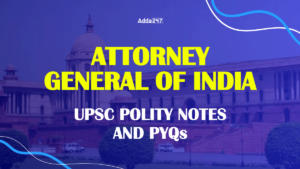Table of Contents
The Fundamental Duties constitute a set of obligations embedded in the Constitution of India on the people of India in correlation with the fundamental rights. India adopted the concept of the fundamental duties from the USSR but not initially, through the 42nd Constitutional Amendment Act.
In this article we will be extensively covering about the need of fundamental duties, list of fundamental duties (11 at present), features, significance and criticism of the fundamental duties, in line with an integrated preparation approach for UPSC prelims and mains GS 2.
What are Fundamental Duties?
The concept of fundamental duties is integral to India’s constitutional framework, emphasizing that alongside rights, citizens bear responsibilities towards the nation and its people. These duties are intended to foster civic responsibility and patriotism, rather than imposing punitive measures. Adherence to these duties enables citizens to actively contribute to the welfare and advancement of the country. While not legally enforceable, fundamental duties carry moral significance and are crucial for promoting responsible citizenship in India.
The concept of fundamental duties, as we discussed earlier, was adopted from the USSR, a socialist country, where such duties are more commonly emphasized. In contrast, democratic countries generally do not prioritize fundamental duties in their constitutions.
In India too, these were not initially added by the farmers of the constitution though they added the DPSP, but fundamental duties were added through the 42nd Constitutional Amendment Act, which added part IVA which contains only one article i.e. Article 51 A containing 10 fundamental duties, and later one more was added in the year 2002
Swaran Singh Committee
Before we move on to learn about the listed fundamental duties, we should also learn about the need of the Fundamental Duties in India
- In 1976, Sardar Swaran Singh Committee was set up to seek for recommendation over the fundamental duties.
- It was during 1975-77 when the need was sought for fundamental duties, during the emergency operations.
- The Sardar Swaran Singh Committee, recommended for a separate chapter in Indian Constitution.
- Though the committee had suggested for 8 duties, but 10 duties were added by the 42nd Constitutional Amendment.
Fundamental Duties of India
- To abide by the Constitution and respect its ideals and institutions, the national flag, and the national anthem.
- To cherish and follow the noble ideals that inspired the national struggle for freedom.
- To uphold and protect the sovereignty, unity, and integrity of India.
- To defend the country and render national service when called upon to do so.
- To promote harmony and the spirit of common brotherhood amongst all the people of India.
- To value and preserve the rich heritage of the country’s composite culture.
- To protect and improve the natural environment, including forests, lakes, rivers, and wildlife.
- To develop scientific temper, humanism, and the spirit of inquiry and reform.
- To safeguard public property and to abjure violence.
- To strive towards excellence in all spheres of individual and collective activity so that the nation constantly rises to higher levels of endeavor and achievement.
- To provide opportunities for education to one’s child or ward between the ages of six and fourteen years.
Fundamental Duties in Hindi
- संविधान का पालन करना और उसके आदर्शों और संस्थाओं, राष्ट्रीय ध्वज और राष्ट्रगान का सम्मान करना।
- राष्ट्रीय स्वतंत्रता संग्राम से प्रेरित महान आदर्शों को चिर स्मरण रखना और उन्हें अनुसरण करना।
- भारत की आजादी, एकता और अखंडता को बनाए रखना।
- देश की रक्षा करना और राष्ट्रीय सेवा करना, जब आवश्यकता हो।
- सभी भारतीय नागरिकों के बीच सद्भाव और सामान्य भाईचारे को बढ़ावा देना।
- भारत की संकल्पना से संबंधित संस्कृति का मूल्य और संरक्षण करना।
- वनों, झीलों, नदियों और वन्य जीवन समेत प्राकृतिक पर्यावरण का संरक्षण और सुधार करना।
- वैज्ञानिक टेम्पर, मानवतावाद और सुधार की भावना विकसित करना।
- सार्वजनिक संपत्ति का संरक्षण करना और हिंसा से दूर रहना।
- व्यक्तिगत और सामूहिक गतिविधियों के सभी क्षेत्रों में उत्कृष्टता की ओर प्रयास करना, ताकि देश निरंतर ऊंचाईयों पर आग
Fundamental Duties (Article 51A)- Key Features
- Nature of Fundamental Duties are moral and civic obligations on the Citizen and are legally non-binding.
- Scope of Fundamental Duties apply to citizens in India only and do not extend to foreigners.
- Fundamental duties are like DPSPs, they are also non-justiciable.
- They are majorly drawn from Indian society’s culture and traditions.
Importance of Fundamental Duties
The Fundamental duties are integral part of the fundamental rights mentioned in the Indian Constitution and it is important to understand about the importance of the fundamental duties.
Importance of Fundamental Duties –
- They warn citizens about involvement against anti-national and anti-social activities in the society.
- They promote discipline among people of the nation.
- They help the judiciary to examine the validity of law.
- They are enforceable by law.
- also they act as the reminder to the citizens that along with there rights they should also maintain a conscious for their duties.
Fundamental Duties Amendment
The fundamental duties of the Indian Constitution saw a notable update with the 86th Constitutional Amendment in 2002. A significant addition emphasized the responsibility of parents or guardians to ensure that children or wards between the ages of six and fourteen receive education.
This amendment aimed to highlight the significance of education and advance the objective of achieving universal elementary education across India.
Criticism for Fundamental Duties
Fundamental duties are mentioned in part IVA of Indian constitution below mentioned are some of the criticism fundamental duties receive-
- The list of duties lack to cover important issues like voting, paying taxes, family planning, etc.
- They should have been added after Part III so as to execute these same as Fundamental Rights.
- Fundamental Duties are non justiciable and are more moral, which people would have themselves incorporated.
- Some of the mentioned duties are not difficult to be understood by a common man.
- All recommendation by the Swaran Singh’s Committee were not added to the constitution, which included:
- penalty for non compliance of the fundamental duties.
- No law for such penalty should be questioned in the court on grounds of fundamental right.
- Duty to pay tax should be a fundamental duty.
UPSC Prelims PYQs for Fundamental Duties
Q1. With reference to the Constitution of India, consider the following. (2010)
1. Fundamental Rights
2. Fundamental Duties
3. Directive Principles of State Policy
Which of the above provisions of the Constitution of India is/are fulfilled by the National Social Assistance Programme launched by the Government of India?
(a) Only 1
(b) Only 3
(c) 1 and 3
(d) All of these
Correct answer : b
Q2. Which of the following is/are among the fundamental duties of citizens laid down in the Indian Constitution? (2012)
1. To preserve the rich heritage of our composite culture.
2. To protect the weaker sections from social injustice.
3. To develop the scientific temper and spirit of inquiry.
4. To strive towards excellence in all spheres of individual and collective activity.
Select the correct answer using the codes given below.
(a) 1 and 2
(b) Only 2
(c) 1,3 and 4
(d) All of these
Correct answer : c
UPSC Mains PYQs for Fundamental Duties
Q1. Enumerate the Fundamental Duties incorporated in the Constitution after the 42nd Amendment. (2008, 15marks)
Q2. Identify the major Fundamental Duties. (150 words)m (2003, 15 Marks)



 Attorney General of India UPSC Notes (Ar...
Attorney General of India UPSC Notes (Ar...
 Election Laws in India UPSC Notes
Election Laws in India UPSC Notes
 Indian Parliamentary Forums UPSC Notes
Indian Parliamentary Forums UPSC Notes




